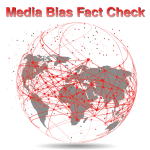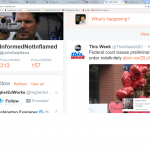 Twitter this morning was a like a Fake News Diarrhea Ward.
Twitter this morning was a like a Fake News Diarrhea Ward.
It was all over the place.
Those right-wing Russian bot helpers?
Nope.
The Whacko-Right may seem to dominate the fake news sphere, but they don’t own it.
This morning I caught one from the left and one from the right. And they were doozies.
The first was a story about an Australian archbishop saying that children victims of pedophile priests also had a religious experience in the midst of the crime.
 Huh?
Huh?
However, a Google search using the main words from the story title and the term “FactCheck” showed this story was not true.
The second fake post said Televangelist Jim Bakker told an audience that when Donald Trump was with porn star Stormy Daniels he talked about turning her to Jesus Christ – and that’s all that happened
Again, another Google search using main words from the story and the term “FactCheck” showed this too was a fake story.
Here’s what I did. I took the links verifying the fake stories and posted them to the Twitter comment boxes as part of the thread of responses.
Most people responded with thanks or likes. Many had the same immediate reaction: this can’t be true! A sign that most of us can decipher BS when we see it.
Still, others deflected. One person said it didn’t matter whether Jim Bakker said it or not since so many evangelicals are siding with Trump.
What?
 My response: if you oppose Trump’s policies and behaviors, why act like him? Posting or acknowledging fake news stories only plays into what you’re opposed to. And it gives his supporters ammunition against you because you posted or didn’t disregard fake news.
My response: if you oppose Trump’s policies and behaviors, why act like him? Posting or acknowledging fake news stories only plays into what you’re opposed to. And it gives his supporters ammunition against you because you posted or didn’t disregard fake news.
What’s so disappointing is the person who posted the fake Jim Bakker story; he has a huge Twitter following. His main agenda is anti-Trump. And some of his stuff is backed up by credible sources. So why would he revert to Trump-like tactics?
The difference: he is trying to be a celebrity not a journalist.
Make sure you’re not doing that.
Here are some guidelines — no matter how many followers you have.
Remember on social media you are now in the 21st Century part of media. Yes you have the freedom to post what you want. But you also have a responsibility. So that means you have to impart knowledge and facts. In other words, act like a journalist. You have a platform that could affect people and possibly circumstances.
How do you know which stories are true? Well, you don’t. You make reasonable assumptions based on credible facts — then provide your evidence.
Remember the most important journalist in your life is you.
 Use posts from reputable news organizations or sources. Make sure a link is attached to show the research. Now, does this mean you take the word of a reputable news organization every time? No. You should question the New York Times, the Wall Street Journal, your local newspaper or television station. But do it with a news media standard of providing links with information that could contradict or add to their story. That doesn’t mean you scream and yell at how liberal or conservative they are.
Use posts from reputable news organizations or sources. Make sure a link is attached to show the research. Now, does this mean you take the word of a reputable news organization every time? No. You should question the New York Times, the Wall Street Journal, your local newspaper or television station. But do it with a news media standard of providing links with information that could contradict or add to their story. That doesn’t mean you scream and yell at how liberal or conservative they are.
A good site to check on the news organization is MediaBiasFactCheck. It will tell you how each news organization leans politically and how good its factual reporting is.
If a post seems too good to be true, then do a search of the Internet using the terms from the story and the term fact check. Most times, the fact checking sites will verify your hunch. Sometimes that wild story is really true. Now, some of you will question the fact checkers. That’s OK too. But question them using facts that you can back up with a link or a post. Too many times people on the right question organizations like factcheck.org which are very reputable and non-partisan.
How do you react to people who post fake stories? Quietly weigh the situation.
Some people have an agenda and will post anything for their side. If this consistently happens, then you may want to block them. However, I think you should continue to follow them to understand what fake stories are being posted and the psychology behind these people. A number of my contacts in military intelligence always told me to never ignore the fringe elements; they may have fragments of a story or the thinking of a certain audience that shouldn’t be ignored.
Another reason not to block someone is because maybe they just made a mistake. Who hasn’t posted stuff that has turned out to be incorrect in some ways?
Create a kind and professional dialogue with the person you’re following. Post the link that shows their information is either wrong or lacking another perspective. No need to attack them. Just point out that they may want to correct or amend their original post. And leave it at that.
You should also consider that the person may have been hacked or they may be fictitious person.
One way I avoid a lot of fake news is my  own Twitter Newsfeed. You can see how I did it and how it works here.
own Twitter Newsfeed. You can see how I did it and how it works here.
But know my biases too.
Some of you may think I am a partisan for the news media. In some cases, you’re right. I have worked in the media. I know good journalism. I still practice good journalism even though I am only on social media. Look at my Twitter News Feed. It has a wide range of news organizations with different slants.
But I have also criticized much of the media for its particular bias. You’ve heard me talk about the entertainment and sports media bias which seems to break down every news story like: a movie script, antagonist versus protagonist; or a sporting event, rooting for one team against the other. I find that type of media bias places every issue into “us vs. them”. It gives a black and white view; and it fails to see gray. It doesn’t examine complex issues in this fast-changing world that Americans need to know about.
For many of you, this is very perplexing and discouraging.
However, don’t think that way.
Instead, realize you have control. Just because someone posts something fake, doesn’t mean you have to believe it.
When you hear a sales pitch, you understand the person giving you the sales pitch is working for that company — to get your money. You take that into consideration before you buy. You may still buy it because the product or service has significance or benefits. The same holds true in news consuming: understand the media’s bias while consuming news.
As I witnessed this morning, most of you are really smart enough to figure that out.
Take control of your social media. Don’t let propaganda or people with an agenda force you into the wrong behavior or incorrect thinking.
There’s another reason to be optimistic.
I am hearing and researching about new technologies on the horizon that will help decipher fake news and propaganda that is being used to attack our democracy.
More on that in future posts.
So hang on.
Comments on this entry are closed.